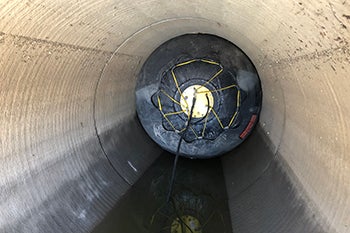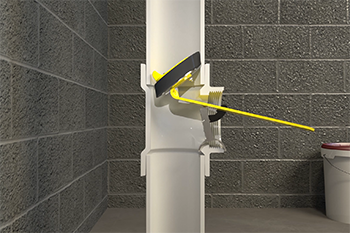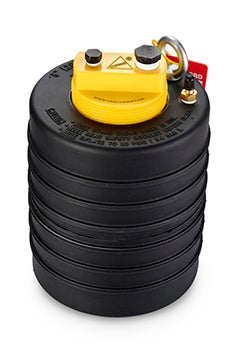Cherne plumbing plugs and testing equipment are relied on by residential and commercial contractors worldwide.
When using a plumbing pipe plug, you are doing one of three things:
- stopping the flow in a pipeline or opening;
- bypassing the flow running through the pipeline, or
- performing a low-pressure air test on a new pipeline before placing it into service; or testing a pipeline already in service for leaks.
Whether you are using a plug for testing, maintenance or repair, it's important to use the appropriate plug for your application. Check out the Cherne Plug Selector Tool to find the right plug for your job in a few easy steps.
If you’re still wondering which plug is right for your application or simply want to learn more, take a look at the plumbing plugs and the different options available below.
Plumbing Plugs
1. Plumbing Blocking Plugs
Plumbing Blocking plugs are used to test DWV (drain, waste and vent) systems. They fit into a variety of pipe diameters and are sealed for testing. A proven solution for testing DWV systems, Cherne Plumbing Test Ball Plugs can seal most type of pipes, including out-of-round, i.e., not having perfect roundness, and are made of natural rubber, providing greater sealing properties as well as excellent expansion and memory.
Below are some of Cherne's most popular plumbing blocking plug options:
- Clean-Seal Plugs eliminate test water backsplash when stack testing DWV systems. They are easy to install and have a natural rubber body that provides a leak-free seal. The Clean Seal Plug holds back up to 13 pounds per square inch, or 30 feet of head pressure; seals both plastic and hard-to-seal cast iron threaded cleanouts; and has high-impact ABS threads for maximum durability.
- Single-Size Test-Ball Plugs are designed to test DWV systems in every type of pipe. These plugs can be inserted through a test tee to seal out-of-round pipe. The plugs have a natural rubber body that provides expansion and a great seal in round and out-of-round pipes. Its inflatable design can fit through test-tees, sanitary tees, floor drains and other hard-to-access pipe openings. This plug is ideal for testing DWV plumbing systems at pressures up to 13 psi (pounds per square inch) or with 30 feet of head pressure, while also utilizing a standard tire air fitting for easy connections. The ring-and-chain assembly helps prevent the plug from being drawn into DWV systems during tests.

- Long Test-Ball Plugs are designed for waste stack testing. Constructed of natural rubber, which provides an excellent seal, these plugs seal the rise and the run to perform tests and can be used to seal the wye to conduct sewer air tests on DWV systems. This plug can withstand up to 13 psi, or 30 feet, of head pressure. Its ring-and-chain assembly, again, helps prevent it from being drawn into the DWV plumbing system during testing.
- Cleanout Gripper Plugs are made with glass-reinforced ABS plastic and have a natural rubber threaded cleanout plug guaranteed to seal most damaged threads. The black color of the plugs blends well with cast-iron pipes. These plugs are NPT-sized, which includes hard-to-find, 3-½ inches.
- Mechanical Cleanout Plugs make it simple to test a DWV system. Available in two-, three- and four-inch configurations, these plugs are built for quick and easy mechanical operation. Each plug's two-stage locking mechanism locks firmly for both test and drain positions, allowing for high-pressure testing up to 150 feet head/65 psi/15 floors (at 10 feet head per floor). Built with durable and replaceable rubber pads, the plugs fit PVC, ABS and cast-iron cleanout tees. They can be installed or removed in seconds without requiring any tools, and no backsplash draining will occur.

2. Plumbing Bypass Plugs
Plumbing Bypass plugs are for installing and repairing residential or commercial piping systems. Used when a system repair is needed while wastewater must continue to flow, these plugs allow both testing and monitoring for pipes up to 16 inches.
Below are Cherne's plumbing bypass plug options:
- Multi-Size Plumbing Muni-Ball plugs are made of natural rubber and offer excellent expansion, memory, and full bypass for testing and monitoring pipe systems. Additionally, the plug can be used to block flow or as a back plug for sewer air testing. One plug can fit multiple pipe diameters with the ability to seal both round and out-of-round pipes and is made with a removable inflation valve.
- Cherne Single-Size Plumbing Muni-Ball plugs work with all pipe types and offer a threaded aluminum bypass. The full bypass allows both testing and monitoring of pipe systems. Made of durable natural rubber, it seals the roughest of surfaces and can be converted to an air test plug using a conversion kit.

Choosing the right plug for your application is as simple as asking yourself the following questions:
- What is the inside diameter of the pipe that needs to be plugged?
- What does the plug need to do? Would it be for blocking a pipeline or an opening, bypassing effluent running through a live pipeline, conducting a pressure test of a new pipeline before placing it into service, or testing a pipeline already in service for leaks?
- What is the point-of-access size into which the plug must be installed? What is the maximum back pressure the plug must withstand?
Take a look at this blog to dive deeper into answering these questions. If you have any questions about which plug is appropriate for your application, please call Cherne technical sales at 1-800-321-9532 / 1-800-THE PLUG.